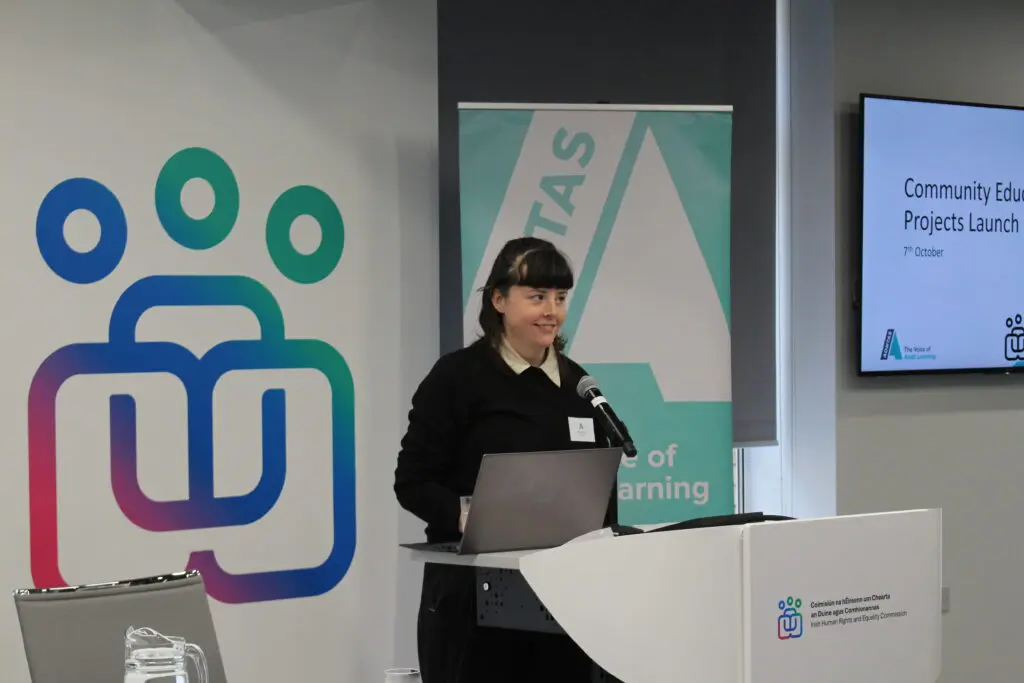How the Community Education Against Disinformation Workbook is Empowering Communities
Community education creates healthier, safer and more inclusive communities.
The Community Education Against Disinformation (CEAD) workbook has been developed by AONTAS in response to a strong demand among the adult and community education sector to counter the hateful and divisive impact of online disinformation and to promote and support community cohesion.
Structural causes of inequality, poverty, the climate crisis, the cost of living, the housing crisis, the decimation of our communities, political alienation and stress have led to growing mistrust in traditional institutions, including mainstream media.
Reactionary online influencers use online communities to peddle disinformation to manipulate issues surrounding these structural inequalities for their own political, monetary and/or ideological agendas. Those online communities, where people often go to rediscover a sense of community, to reclaim their political voice and to seek answers to social issues our governments are failing to address, contribute to an environment where disinformation can spread rapidly. There is poor regulation over social media platforms to stem the tide of online disinformation and a lack of political will to enforce legislation like the Digital Safety Act. All these issues combined lead to the rising socio-political polarisation our society is struggling to come to terms with.
Community education creates healthier, safer and more inclusive communities.
Community education centres are often located in communities where the worst effects of online disinformation, structural inequality, poverty and political alienation are felt.
Community education centres are ideal spaces where the delivery of a digital capacity-building, community empowerment workbook can take place. Community education presents a unique opportunity for participants to have meaningful dialogue in a safe and supportive space where adult educators can validate different emotional responses, challenge assumptions and support their learners in connecting with themselves and with one another.
Although a very daunting task, community education can take a leadership role within communities most affected by online disinformation.
The Community Education Against Disinformation Workbook
The CEAD workbook is dedicated to supporting those who deliver its activities. The workbook has undergone a thorough ethical review by consultants specialising in psychology, mental health and human rights to safeguard those who engage with it.
It is trauma-informed, recognising that many learners come to community education from contexts of hardship or exclusion. Rather than promising “safe spaces”, the workbook invites the creation of “brave spaces”, where difficult conversations can be had with care and respect.
The workbook requires good facilitators with an understanding of learner needs and pedagogical skills to establish an appropriate context for workbook activities. The workbook is not an instruction manual, but rather a guide for facilitators to mix and match activities as they see fit. The workbook does not expect educators to be proficient in the complex world of disinformation. It will, however, ask facilitators to reflect on how they personally engage with disinformation and, at times, have them question themselves.
Collaboration
Community education organisations and learners who trialled the workbook have contributed to vital changes throughout the development of the workbook. These included the incorporation of more accessible language across the activities, adaptations of certain activities to increase learner interactivity and changes to the facilitator guide to improve understanding and usability.
Users of the workbook described the impact the activities had on their group and on the wider community, including changes in how their group engages with disinformation. Now they can explore it with curiosity and critical reflection in a supportive and often humorous way, the effects of which, they shared, ripple out into the wider community.
Workbook activity content
The workbook is divided into two main activity sections, exploring the four pillars of Global Citizenship Education: Critical Thinking, Problem Solving, Systems Thinking and Active Citizenship. The Building Blocks section includes foundational activities to prepare learners to undertake more complex activities in the Critical Issues section. The Building Blocks activities include areas where learners can enhance their communication and critical thinking skills, while the final activity in the section focuses on how our values, though often unconscious, play a pivotal role in shaping our society. It also addresses how media and peddlers of disinformation can frame messages that tap into, exploit and potentially reshape our collective values.
The Critical Issues section examines the deepening scepticism of mainstream media and the content it produces. Since the very concept of truth is now debatable, fact-checking can no longer be offered as the sole solution to challenge disinformation. While the Critical Issues section does contain fact-checking activities, they are situated among an array of tools linking interdependent issues that:
- build on our understanding of media bias;
- highlight the power algorithms have in creating the illusion that hatred towards certain groups targeted by disinformation is felt universally;
- empower us to recognise AI-created content;
- help us acknowledge the role nefarious online actors play in using storytelling tactics and deliberative narrative work to stoke group division and emotionally manipulate; and
- strengthen our connection with ourselves and with one another.
The workbook contains an optional activity matrix highlighting complementary sections of the workbook.
Next steps
Preventing the further spread of disinformation and increase in social polarisation requires a collective effort. AONTAS is establishing a community of practice among adult educators to support the workbook’s implementation and to provide a space for users to share their experiences and learning from delivering the workbook activities. Please contact mail@aontas.com if you are interested in hearing more about this.
AONTAS is developing a series of workshops to disseminate the workbook in 2026. We will have more information about those workshops in the coming months.
Online disinformation requires cross-sector cooperation that includes stronger investment in digital literacy, greater regulation of social media platforms and stronger support for community education to be able to provide transformative learning initiatives. Our hope is that the Community Education Against Disinformation workbook can contribute to this collective effort.
Please find the link to the AONTAS Community Education Against Disinformation Workbook.
The AONTAS Community Education Against Disinformation Workbook.
The AONTAS Community Education Against Disinformation Workbook offers practical activities and guidance for educators and community groups seeking to build digital resilience and promote critical thinking.
Download the full workbook below to explore how community education can help counter online disinformation and strengthen social cohesion.
News
The very latest news from the adult and community education sector
Blog
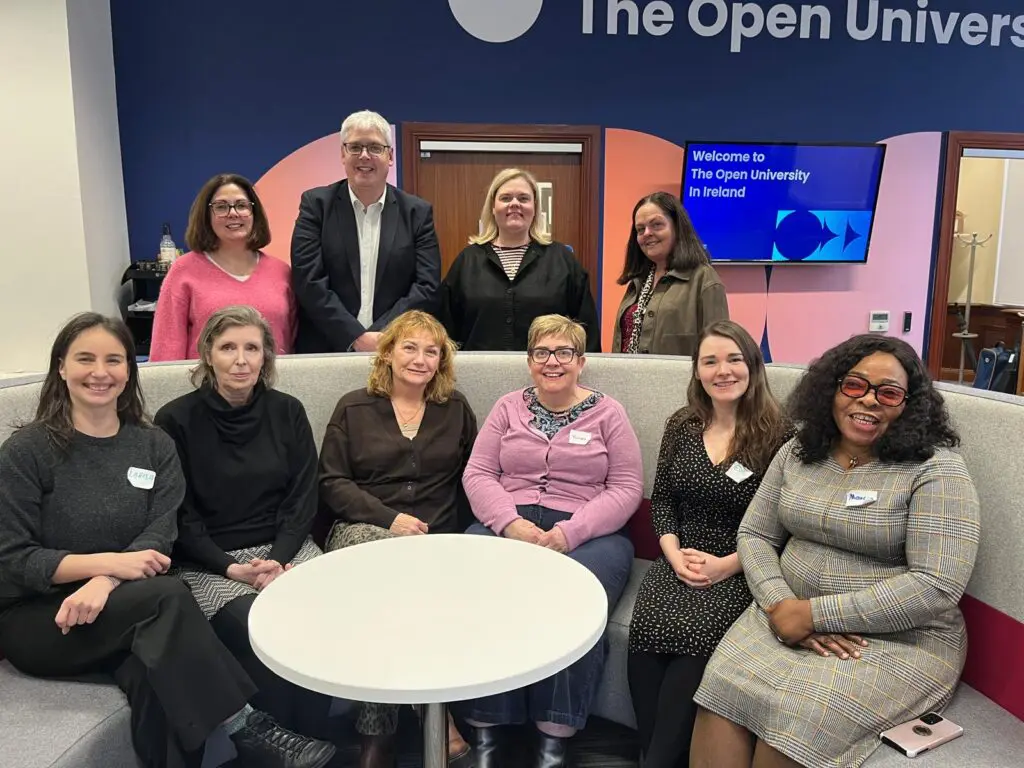
What happens when those with an interest in adult learning come together to build shared understanding? An Example from Northern Ireland
23 February 2026
What happens when those with an interest in adult learning come together to build shared understanding? An Example from Northern...
Blog
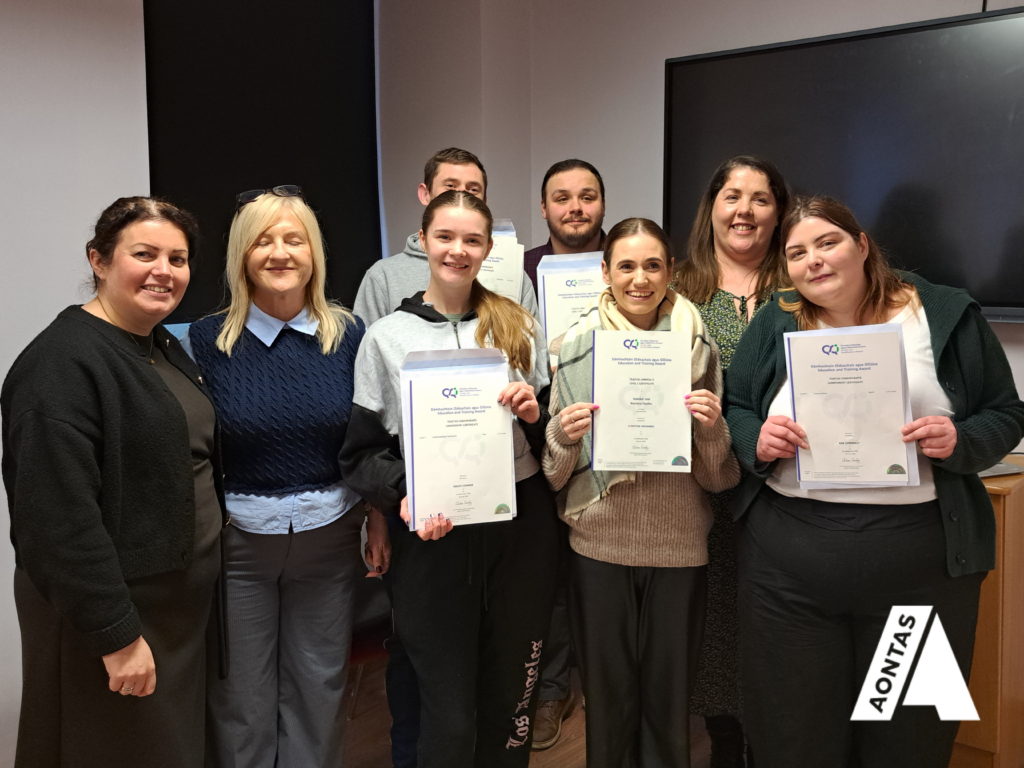
Celebrating Community, Hope, and Achievement with Acorn Youth Work Ireland Midlands, Education and Training Service
12 February 2026
Celebrating Community, Hope, and Achievement with Acorn Youth Work Ireland Midlands, Education and Training Service Written by Lorraine O’Connor Published...
News
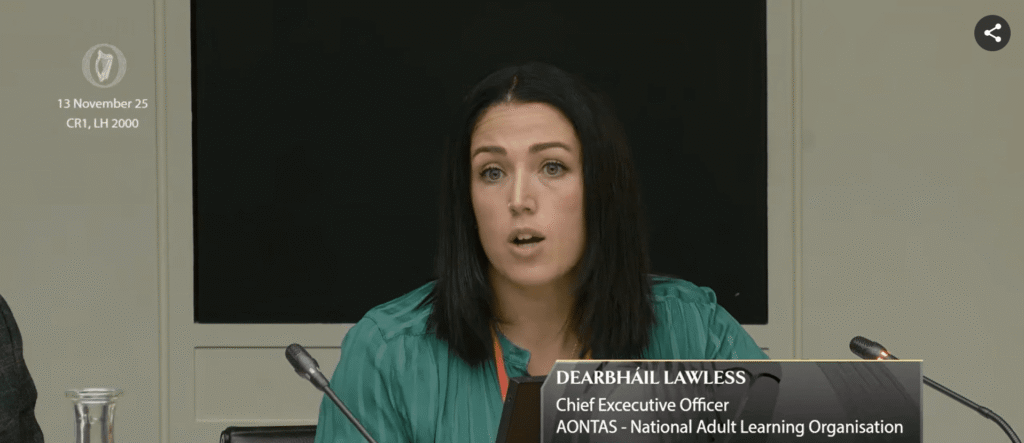
AONTAS Statement on Voluntary and Community Sector Cuts in Northern Ireland
3 February 2026
AONTAS Statement on Voluntary and Community Sector Cuts in Northern Ireland Written by Conor Thompson Published on February 3, 2026...
News
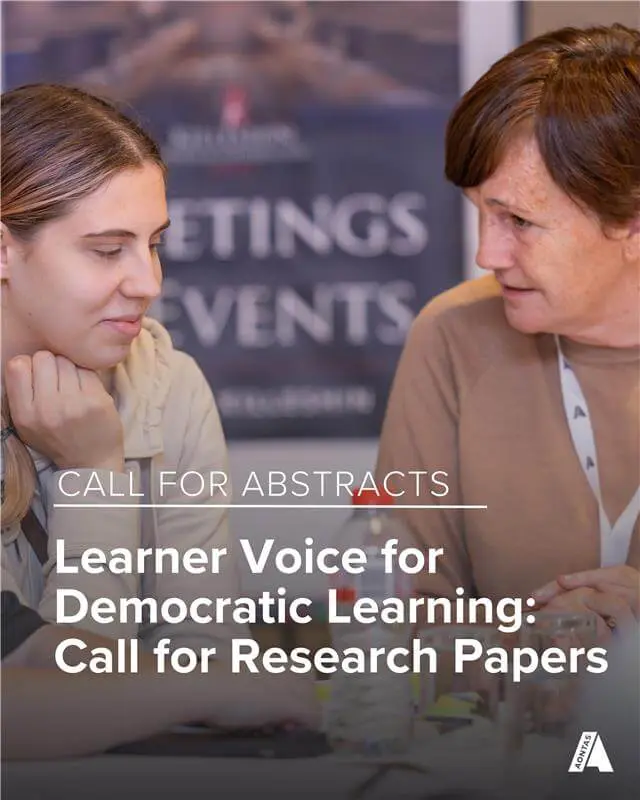
Call for Abstracts | Fourth International Conference of the Scuola Democratica
23 January 2026
News
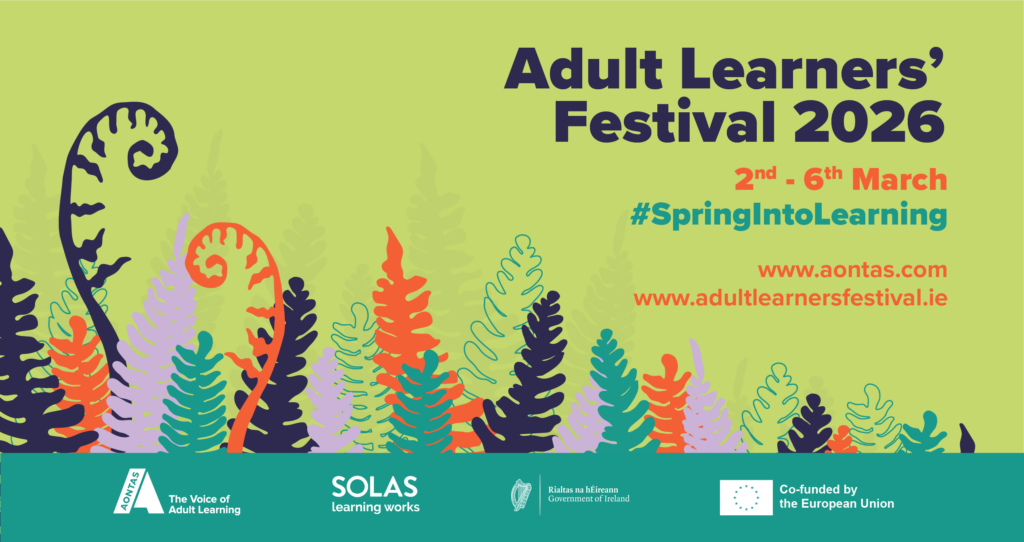
Spring Into Learning with the 2026 AONTAS Adult Learners’ Festival
20 January 2026
Spring Into Learning with the 2026 AONTAS Adult Learners’ Festival Written by Megan Fearon Published on January 20, 2026 Share...
News
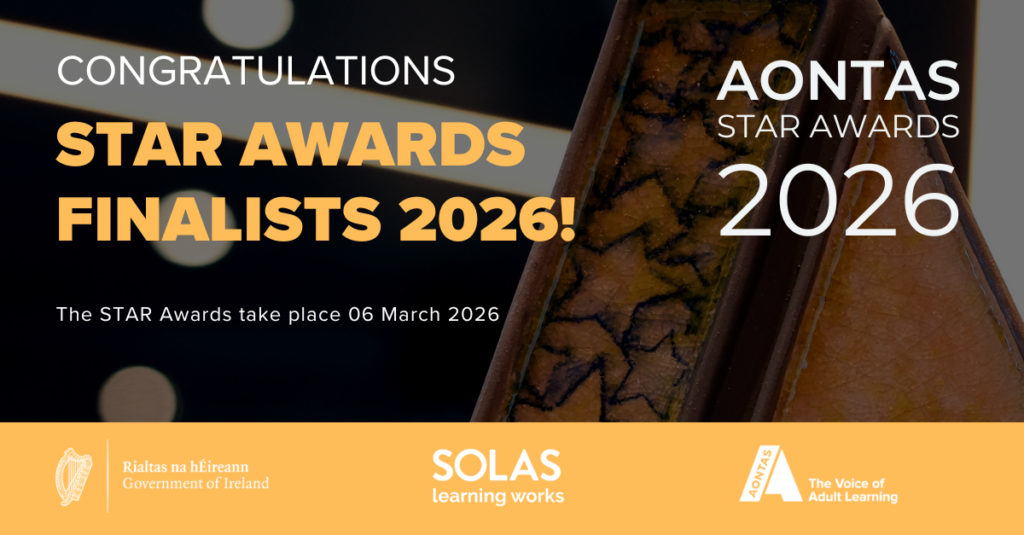
AONTAS Announces 2026 STAR Awards Shortlist!
16 January 2026
How the Community Education Against Disinformation Workbook is Empowering Communities
Community education creates healthier, safer and more inclusive communities.
The Community Education Against Disinformation (CEAD) workbook has been developed by AONTAS in response to a strong demand among the adult and community education sector to counter the hateful and divisive impact of online disinformation and to promote and support community cohesion.
Structural causes of inequality, poverty, the climate crisis, the cost of living, the housing crisis, the decimation of our communities, political alienation and stress have led to growing mistrust in traditional institutions, including mainstream media.
Reactionary online influencers use online communities to peddle disinformation to manipulate issues surrounding these structural inequalities for their own political, monetary and/or ideological agendas. Those online communities, where people often go to rediscover a sense of community, to reclaim their political voice and to seek answers to social issues our governments are failing to address, contribute to an environment where disinformation can spread rapidly. There is poor regulation over social media platforms to stem the tide of online disinformation and a lack of political will to enforce legislation like the Digital Safety Act. All these issues combined lead to the rising socio-political polarisation our society is struggling to come to terms with.
Community education creates healthier, safer and more inclusive communities.
Community education centres are often located in communities where the worst effects of online disinformation, structural inequality, poverty and political alienation are felt.
Community education centres are ideal spaces where the delivery of a digital capacity-building, community empowerment workbook can take place. Community education presents a unique opportunity for participants to have meaningful dialogue in a safe and supportive space where adult educators can validate different emotional responses, challenge assumptions and support their learners in connecting with themselves and with one another.
Although a very daunting task, community education can take a leadership role within communities most affected by online disinformation.
The Community Education Against Disinformation Workbook
The CEAD workbook is dedicated to supporting those who deliver its activities. The workbook has undergone a thorough ethical review by consultants specialising in psychology, mental health and human rights to safeguard those who engage with it.
It is trauma-informed, recognising that many learners come to community education from contexts of hardship or exclusion. Rather than promising “safe spaces”, the workbook invites the creation of “brave spaces”, where difficult conversations can be had with care and respect.
The workbook requires good facilitators with an understanding of learner needs and pedagogical skills to establish an appropriate context for workbook activities. The workbook is not an instruction manual, but rather a guide for facilitators to mix and match activities as they see fit. The workbook does not expect educators to be proficient in the complex world of disinformation. It will, however, ask facilitators to reflect on how they personally engage with disinformation and, at times, have them question themselves.
Collaboration
Community education organisations and learners who trialled the workbook have contributed to vital changes throughout the development of the workbook. These included the incorporation of more accessible language across the activities, adaptations of certain activities to increase learner interactivity and changes to the facilitator guide to improve understanding and usability.
Users of the workbook described the impact the activities had on their group and on the wider community, including changes in how their group engages with disinformation. Now they can explore it with curiosity and critical reflection in a supportive and often humorous way, the effects of which, they shared, ripple out into the wider community.
Workbook activity content
The workbook is divided into two main activity sections, exploring the four pillars of Global Citizenship Education: Critical Thinking, Problem Solving, Systems Thinking and Active Citizenship. The Building Blocks section includes foundational activities to prepare learners to undertake more complex activities in the Critical Issues section. The Building Blocks activities include areas where learners can enhance their communication and critical thinking skills, while the final activity in the section focuses on how our values, though often unconscious, play a pivotal role in shaping our society. It also addresses how media and peddlers of disinformation can frame messages that tap into, exploit and potentially reshape our collective values.
The Critical Issues section examines the deepening scepticism of mainstream media and the content it produces. Since the very concept of truth is now debatable, fact-checking can no longer be offered as the sole solution to challenge disinformation. While the Critical Issues section does contain fact-checking activities, they are situated among an array of tools linking interdependent issues that:
- build on our understanding of media bias;
- highlight the power algorithms have in creating the illusion that hatred towards certain groups targeted by disinformation is felt universally;
- empower us to recognise AI-created content;
- help us acknowledge the role nefarious online actors play in using storytelling tactics and deliberative narrative work to stoke group division and emotionally manipulate; and
- strengthen our connection with ourselves and with one another.
The workbook contains an optional activity matrix highlighting complementary sections of the workbook.
Next steps
Preventing the further spread of disinformation and increase in social polarisation requires a collective effort. AONTAS is establishing a community of practice among adult educators to support the workbook’s implementation and to provide a space for users to share their experiences and learning from delivering the workbook activities. Please contact mail@aontas.com if you are interested in hearing more about this.
AONTAS is developing a series of workshops to disseminate the workbook in 2026. We will have more information about those workshops in the coming months.
Online disinformation requires cross-sector cooperation that includes stronger investment in digital literacy, greater regulation of social media platforms and stronger support for community education to be able to provide transformative learning initiatives. Our hope is that the Community Education Against Disinformation workbook can contribute to this collective effort.
Please find the link to the AONTAS Community Education Against Disinformation Workbook.
The AONTAS Community Education Against Disinformation Workbook.
The AONTAS Community Education Against Disinformation Workbook offers practical activities and guidance for educators and community groups seeking to build digital resilience and promote critical thinking.
Download the full workbook below to explore how community education can help counter online disinformation and strengthen social cohesion.
News
The very latest news from the adult and community education sector
Blog

What happens when those with an interest in adult learning come together to build shared understanding? An Example from Northern Ireland
23 February 2026
What happens when those with an interest in adult learning come together to build shared understanding? An Example from Northern...
Blog

Celebrating Community, Hope, and Achievement with Acorn Youth Work Ireland Midlands, Education and Training Service
12 February 2026
Celebrating Community, Hope, and Achievement with Acorn Youth Work Ireland Midlands, Education and Training Service Written by Lorraine O’Connor Published...
News

AONTAS Statement on Voluntary and Community Sector Cuts in Northern Ireland
3 February 2026
AONTAS Statement on Voluntary and Community Sector Cuts in Northern Ireland Written by Conor Thompson Published on February 3, 2026...
News

Call for Abstracts | Fourth International Conference of the Scuola Democratica
23 January 2026
News

Spring Into Learning with the 2026 AONTAS Adult Learners’ Festival
20 January 2026
Spring Into Learning with the 2026 AONTAS Adult Learners’ Festival Written by Megan Fearon Published on January 20, 2026 Share...
News

